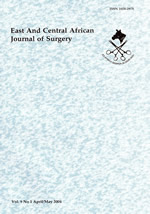
|
East and Central African Journal of Surgery
Association of Surgeons of East Africa and College of Surgeons of East Central and Southern Africa
ISSN: 1024-297X
EISSN: 1024-297X
Vol. 19, No. 3, 2015, pp. 53-58
|
 Bioline Code: js14056
Bioline Code: js14056
Full paper language: English
Document type: Research Article
Document available free of charge
|
|
|
East and Central African Journal of Surgery, Vol. 19, No. 3, 2015, pp. 53-58
| en |
Assessment of DRE and PSA as Diagnostic and Screening Tools for Carcinoma of the Prostate in Rural Nigeria.
Irekpita, E.; Owobu, C.; Aigbe, E.; Obasikene, G. & Igbe, A.
Abstract
Background: Carcinoma of the Prostate is a major health burden globally. This study was
aimed at assessing the value of digital rectal examination and prostate specific antigen as
screening and diagnostic tools for carcinoma of the prostate in rural Nigeria
Methods: Men who had abnormal digital rectal examination (DRE) findings, elevated
prostate specific antigen (PSA) and prostatic histology within the period were included in
the study. Data related to age, PSA value, DRE findings and histology were analyzed using
SPSS and simple statistical methods.
Result: The total number of patients was one hundred and fifty eight. The peak decade of
occurrence of prostate cancer was the 61-70 years. When DRE findings was cross tabulated
with histology, there was a significant correlation (P=.000). The positive predictive value
(PPV) of DRE was 96.15% while the negative predictive value (NPV) was 93.5%. For PSA,
there was also a significant correlation (P=.000). The PPV of PSA was 64.9% while the NPV
was 96.33%.
Conclusion: The extremely impressive performance of DRE and PSA as diagnostic and
screening tools may be due to the limitation of the study to a cohort of patients who already
hard lower urinary tract symptoms. There is need for community based studies.
Keywords
Screening; DRE; PSA; Positive predictive value; Negative predictive value; Prostate cancer
|
| |
© Copyright 2014 - East and Central African Journal of Surgery
|
|
